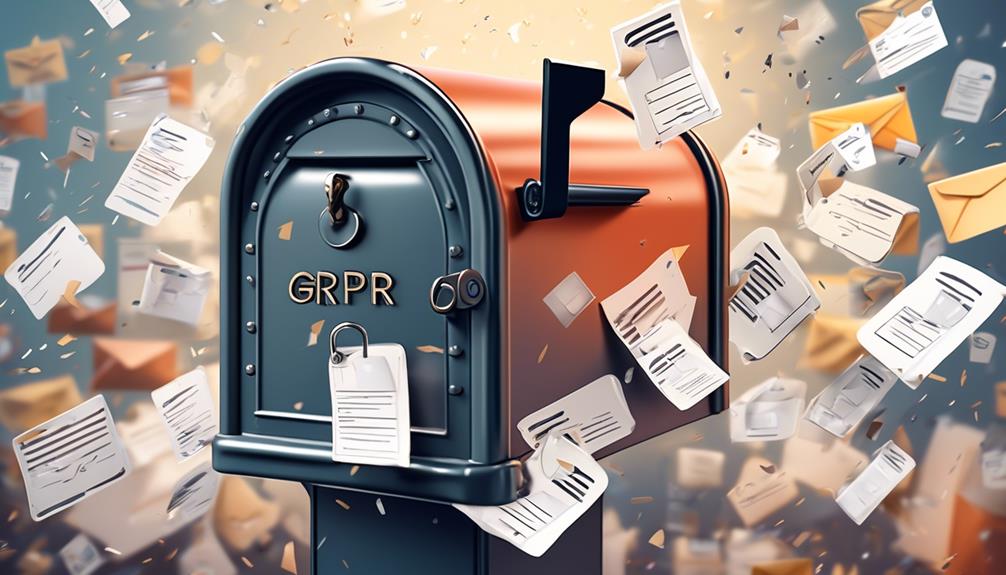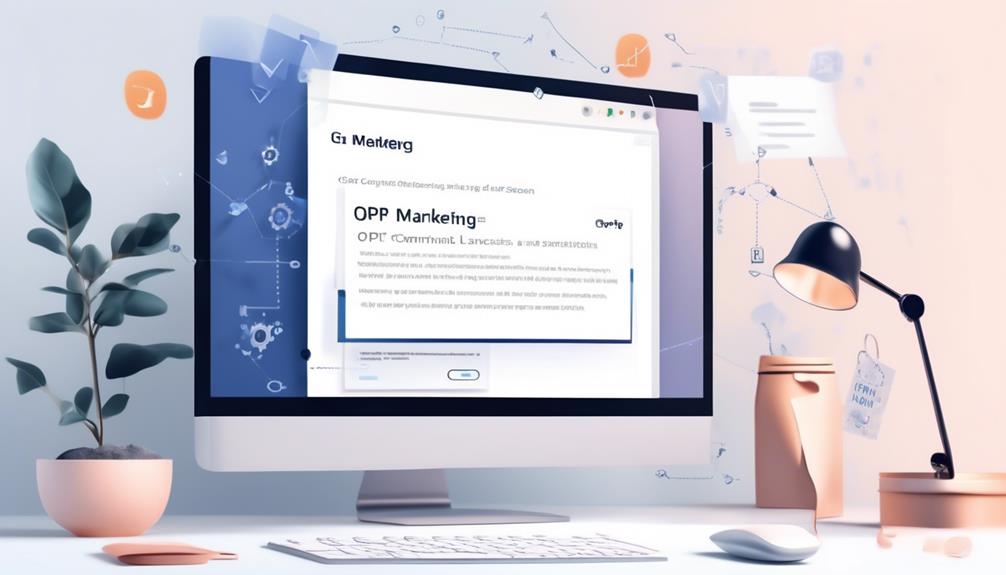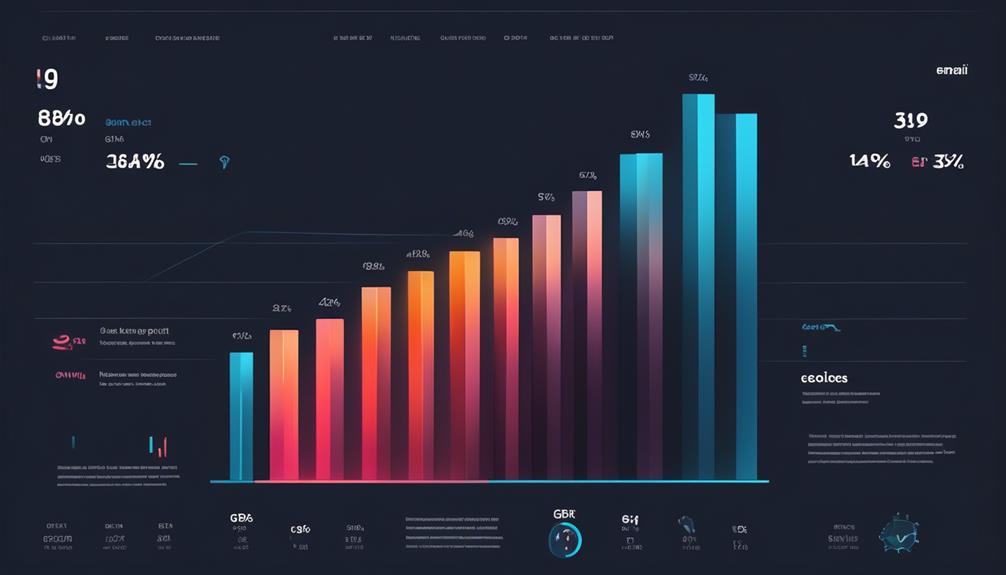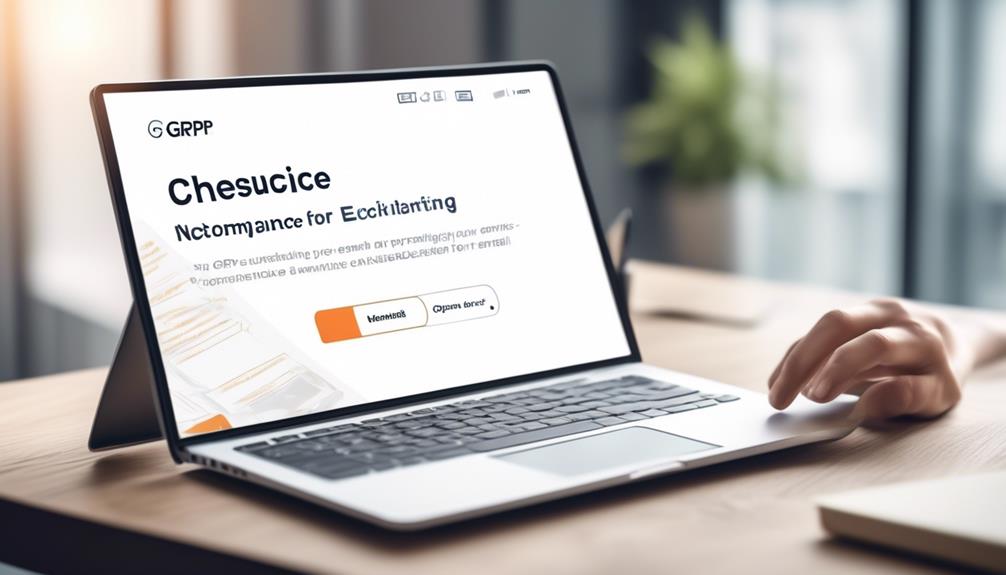We understand that some individuals may feel hesitant initially when considering how GDPR impacts email marketing strategies. The regulations have indeed brought about significant changes in how marketers can interact with their audience.
From obtaining explicit consent for each marketing email to ensuring stringent data protection measures, the GDPR has reshaped the landscape of email marketing.
But what does this mean for marketers, and how have their strategies evolved in response to these regulations? The answer lies in the fundamental shift towards prioritizing quality over quantity, building trust with subscribers, and demonstrating a commitment to data privacy.
Key Takeaways
- Shift towards permission-based strategies in email marketing
- Requirement for explicit consent for sending marketing emails
- Decrease in email marketing databases due to removal of contacts without consent
- Focus on quality over quantity in email marketing efforts
Impact of GDPR on Email Marketing
After the implementation of GDPR, email marketing has undergone a significant shift towards permission-based strategies, necessitating a reevaluation of our outreach tactics. The data protection laws under GDPR require us to obtain explicit consent for sending marketing emails, impacting our email marketing strategy. Non-compliance can result in hefty fines, emphasizing the need to comply with GDPR.
As a result, there's been a decrease in email marketing databases due to the removal of contacts without consent, leading to a focus on quality over quantity in our email marketing efforts. Clear and transparent opt-in processes are now required, enhancing trust and credibility with customers. Our team has had to adapt to comply with the new regulations, ensuring that our email marketing practices align with GDPR requirements.
Despite the challenges, the improved data protection practices have led to increased trust and better customer relationships, highlighting the positive impact of GDPR on building stronger connections with our subscribers. Adhering to GDPR hasn't only ensured legal compliance but has also enhanced the overall effectiveness of our email marketing endeavors.
GDPR's Influence on Marketing Strategies

As marketing professionals, we're facing the challenge of adapting our strategies to comply with GDPR regulations.
The legal opt-in requirements and the impact of data protection are crucial factors shaping our email marketing tactics.
Our focus on email consent management has become paramount in building trust and credibility with our subscribers.
Legal Opt-In Requirements
Implementing clear and transparent opt-in processes is now a mandatory practice for email marketing under GDPR regulations. This means that businesses must obtain explicit consent from individuals before sending marketing emails, ensuring a more respectful and compliant approach to handling personal data. Non-compliance can result in substantial fines, prompting businesses to revamp their email marketing strategies. As a result, email marketing databases have shrunk due to the removal of contacts without explicit consent. However, this has led to improved data protection practices, fostering increased trust and stronger customer relationships. Below is a table summarizing the impact of GDPR on email marketing tactics.
| Impact of GDPR on Email Marketing |
|---|
| Mandatory opt-in processes |
| Decreased email databases |
| Improved data protection practices |
| Increased trust and relationships |
| Potential fines for non-compliance |
Data Protection Impact
Incorporating GDPR's data protection requirements has fundamentally transformed our marketing strategies, necessitating a meticulous approach to handling personal data in all our email campaigns.
The impact of GDPR on email marketing tactics is significant, as it requires explicit consent for marketing emails, mandates clear and transparent opt-in processes, and imposes the risk of substantial fines for non-compliance. Furthermore, the removal of contacts without consent has led to a decrease in email marketing databases.
By prioritizing data protection and privacy, businesses can build trust and enhance customer relationships, ultimately leading to improved compliance with GDPR and better practices in handling personal data.
This shift towards a more cautious and conscientious approach underscores the critical importance of data protection in email marketing strategies.
Email Consent Management
Our email marketing strategies have evolved significantly under GDPR's influence, particularly in the realm of Email Consent Management. With GDPR requiring explicit consent for marketing communication, we've witnessed a reduction in our email databases as contacts without consent were removed. To adapt, we've implemented double opt-in processes and segmented our email lists based on consent status. Despite the challenges, GDPR has steered us towards quality over quantity in our marketing efforts, fostering enhanced trust and credibility with our subscribers. However, compliance complexities and the need to rebuild databases remain ongoing challenges. Looking ahead, GDPR sets a global precedent for data privacy regulations, driving innovation in our email marketing strategies as we continuously monitor and adapt to GDPR updates for sustained success.
| Benefits of GDPR for Email MarketingChallenges in GDPR ComplianceFuture Outlook for Email Marketing under GDPR | ||
|---|---|---|
| Focus on quality over quantity | Understanding complex regulations | Global precedent for data protection regulations |
| Enhanced trust and credibility with customers | Rebuilding email marketing databases | Driving innovation in email marketing strategies |
GDPR's Implications for Email Marketing

We've seen a significant shift in email marketing practices due to GDPR's stringent consent requirements. Our approach to obtaining and managing marketing permissions has been fundamentally altered, impacting our email databases and subscriber engagement.
The implications of GDPR on email marketing are far-reaching, influencing everything from data protection to how we interact with our subscribers.
Email Consent Requirements
Email marketing tactics have undergone significant changes due to the GDPR's stringent requirements for explicit consent. As a result, businesses must adapt their marketing practices to comply with email consent requirements.
To ensure GDPR compliance and respect the rights of data subjects, businesses now need to implement clear and transparent opt-in processes to obtain explicit consent for using personal data in email marketing efforts. This includes reviewing and updating privacy policies, as well as implementing double opt-in processes to confirm user consent.
Additionally, the focus has shifted from quantity to quality in email marketing databases, with a decrease in contacts without explicit consent.
Data Protection Impact
Implementing GDPR's data protection impact on email marketing requires a thorough understanding of the regulations and a strategic approach to compliance. Under GDPR, data protection is paramount in email marketing, influencing various aspects including data collection, privacy law compliance, and marketing tactics. The table below illustrates the key implications of GDPR's data protection impact on email marketing.
| GDPR Data Protection Impact | Implications for Email Marketing |
|---|---|
| Explicit Consent Required | Ensures compliance and respects user privacy rights |
| Hefty Fines for Non-Compliance | Essential for businesses to adhere to regulations |
| Quality Over Quantity | Decrease in email marketing databases due to removal of contacts without explicit consent |
| Transparent Opt-In Processes | Enhances user understanding and control over their data |
| Improved Trust and Relationships | Benefits businesses in the long run |
GDPR's data protection impact has reshaped email marketing, emphasizing respect for personal data, clear consent processes, and ultimately improving customer relationships.
Marketing Permission Changes
Adapting to the marketing permission changes brought about by GDPR has necessitated a thorough review of our email marketing strategies and a reevaluation of our approach to obtaining consent from our subscribers. This shift has led to the implementation of clear and transparent opt-in processes, emphasizing explicit consent for marketing emails.
To comply with GDPR and navigate these changes effectively, we've focused on:
- Reviewing and updating privacy policies to ensure transparency and clarity in consent processes.
- Implementing double opt-in processes to obtain explicit consent from subscribers before including them in our email lists.
- Segmenting email lists based on consent status to ensure that only individuals who've provided consent receive marketing communications.
These adjustments haven't only ensured compliance with GDPR but have also led to improved trust and credibility with our subscribers.
Profiling Data Under GDPR for Targeted Emails

Prioritizing lawful and transparent data collection and processing is essential when profiling data under GDPR for targeted emails. GDPR's stringent regulations require email marketers to handle personal data with care and respect for individuals' privacy. This means obtaining explicit consent from subscribers before sending targeted email communications.
Utilizing explicit opt-in processes ensures that individuals have knowingly and willingly agreed to receive such emails, enhancing data protection and privacy. Furthermore, GDPR encourages the implementation of segmentation based on consent status for personalized messaging, allowing marketers to tailor their content to align with subscribers' preferences and interests.
It's crucial to ensure that subscribers have clear and easy-to-use unsubscribe options, as GDPR emphasizes the freedom for individuals to manage their email preferences. Regularly reviewing and updating email marketing practices is essential for maintaining GDPR compliance and building trust with subscribers.
GDPR's Effect on Engagement Rates

We've seen GDPR's impact on engagement rates in email marketing.
Open rates are affected as explicit consent is now required, potentially leading to smaller but more engaged audiences.
Click-through rates may also see changes as email content adapts to comply with GDPR regulations.
Impact on Open Rates
Implementing GDPR compliance in email marketing has significantly affected open rates and engagement metrics. The impact on open rates is a crucial aspect of email marketing tactics in the GDPR era. Here's how GDPR has influenced open rates:
- Obtaining permission and consent before sending emails is now a mandatory practice, directly impacting open rates.
- Sending unsolicited emails without consent is considered a violation of GDPR, leading to decreased engagement rates.
- GDPR's emphasis on quality over quantity in email marketing efforts can lead to improved engagement rates and foster trust between businesses and customers.
These changes reflect a shift towards prioritizing data protection and building meaningful connections with subscribers, ultimately influencing open rates and engagement metrics in email marketing.
Influence on Click-Through Rates
With the implementation of GDPR regulations, email marketing has experienced a noticeable impact on click-through rates, reflecting a shift towards more targeted and consent-based engagement strategies. Under GDPR, clear consent is required for sending marketing emails, leading to decreased email marketing databases as non-consenting contacts are removed. This shift towards more targeted subscriber lists has led to improved click-through rates as marketers engage with a more receptive audience. Additionally, the improved data protection practices mandated by GDPR have increased trust and transparency, resulting in better customer relationships and, consequently, higher click-through rates. The table below outlines the key factors influencing click-through rates in the context of GDPR's influence on email marketing tactics.
| Factors Influencing Click-Through Rates | Impact on Engagement |
|---|---|
| Clear consent for email marketing | Increased engagement due to opt-in subscribers |
| Reduced email marketing databases | More targeted and receptive audience |
| Improved data protection practices | Increased trust leading to better customer relationships |
| GDPR compliance | Enhanced transparency and trust, impacting engagement |
Changes in Email Content
As we explore the impact of GDPR on email marketing tactics, the focus shifts to the changes in email content and how they affect engagement rates. The new regulations have prompted significant alterations in the way we approach email marketing.
To adapt to GDPR's requirements and improve engagement rates, we've implemented the following changes:
- Crafting relevant content: We're now focusing on creating personalized and relevant content that resonates with our audience's interests and preferences.
- Implementing transparent opt-in processes: Clear and transparent opt-in processes are now a priority, ensuring that subscribers explicitly consent to receiving marketing messages.
- Prioritizing data protection: We've strengthened our data protection practices to build trust and enhance customer relationships, ultimately leading to improved email engagement rates.
These adjustments haven't only ensured compliance with GDPR but have also positively impacted our email engagement rates.
Transparency in Email Marketing Campaigns

In email marketing campaigns, clear and transparent opt-in processes are now required under GDPR, ensuring explicit consent is obtained from users before including them in marketing lists. This means that companies must be upfront about how they collect and use personal data, and individuals must actively agree to be part of email marketing campaigns. Additionally, under GDPR, email marketers are obligated to provide easy and clear unsubscribe options to subscribers, giving them the right to opt-out at any time. This transparency in obtaining consent and providing opt-out options demonstrates a commitment to data protection and respects the individual's control over their personal information.
| Key Principles of GDPR in Email Marketing Campaigns |
|---|
| Clear and transparent opt-in processes |
| Explicit consent from users |
| Easy and clear unsubscribe options |
| Transparency in personal data collection and usage |
| Respecting individuals' right to opt-out |
This emphasis on transparency and consent not only aligns with GDPR requirements but also fosters trust and credibility with subscribers, ultimately leading to more meaningful and respectful email marketing campaigns.
Criticality of Data Privacy Rules for Marketers

Compliance with data privacy rules is essential for marketers, as it not only mitigates the risk of substantial fines and legal consequences but also fosters trust and long-term relationships with subscribers. Adhering to data privacy rules is critical, especially considering the impact of GDPR on email marketing tactics.
Here are key reasons why data privacy rules are crucial for marketers:
- Avoiding Legal Consequences: Non-compliance with data privacy rules, such as GDPR, can result in severe financial penalties and legal actions, significantly impacting a company's bottom line and reputation.
- Quality Over Quantity: Marketers must prioritize obtaining explicit consent for email marketing, even if it means reducing the size of their email databases. This shift emphasizes the importance of engaging with individuals who have a genuine interest in the brand, leading to higher quality interactions.
- Building Trust and Loyalty: Upholding data privacy rules, like transparent opt-in processes and clear privacy policies, can enhance customer trust and foster long-term relationships with subscribers. This focus on data protection demonstrates a commitment to respecting individuals' personal data, ultimately strengthening the bond between marketers and their audience.
Marketers need to adapt their email marketing strategies to align with these data privacy regulations, ensuring that their practices prioritize both compliance and customer trust.
GDPR's Impact on Email Marketing Compliance

The implementation of GDPR has reshaped email marketing practices, necessitating a fundamental shift in how businesses obtain and manage consent for marketing communications. Under GDPR regulations, obtaining explicit consent for marketing emails has become mandatory. Non-compliance can lead to substantial fines, and as a result, email marketing databases have decreased due to the removal of contacts without consent. Clear and transparent opt-in processes are now obligatory, requiring businesses to ensure that individuals have actively opted in to receive marketing communications. These changes have significantly impacted email marketing compliance, forcing businesses to reevaluate their marketing activities to align with GDPR requirements. However, improved data protection practices have led to increased trust and better customer relationships in email marketing. As a result, businesses that prioritize compliance with GDPR regulations not only avoid potential penalties but also foster a more positive and transparent relationship with their customers.
| Impact of GDPR on Email Marketing Compliance | |
|---|---|
| Mandatory explicit consent for marketing emails | Decrease in email marketing databases |
| Non-compliance leads to substantial fines | Clear and transparent opt-in processes required |
| Improved data protection practices | Increased trust and better customer relationships |
Strategies for GDPR-Compliant Email Marketing

With the reshaping of email marketing practices under GDPR regulations, businesses are now focusing on implementing effective strategies for GDPR-compliant email marketing. To ensure compliance and uphold data protection standards, we're adopting the following strategies:
- Review and Update Privacy Policies: We're thoroughly reviewing and updating our privacy policies to align with GDPR regulations, clearly outlining how we collect, process, and store personal data.
- Implement Double Opt-In Processes: We're implementing double opt-in processes to obtain explicit consent from subscribers before sending them marketing emails. This ensures that subscribers proactively confirm their willingness to receive communications.
- Segment Email Lists Based on Consent Status: We're segmenting our email lists based on consent status to ensure that marketing communications are only sent to individuals who've provided explicit consent. This helps us maintain GDPR compliance and respects subscribers' preferences.
Optimizing Email Marketing Under GDPR

We are streamlining our email marketing tactics to align seamlessly with GDPR regulations, prioritizing data privacy and customer trust. Optimizing email marketing under GDPR involves adapting to the new landscape of explicit consent requirements and focusing on quality over quantity. We are implementing strategies such as double opt-in processes and segmenting email lists based on consent status to ensure compliance while maintaining effective communication with our audience.
| Challenges | Solutions |
|---|---|
| Understanding complex regulations | Conducting thorough training and seeking legal counsel |
| Rebuilding email marketing databases for consent | Implementing re-permission campaigns and creating compelling value propositions |
| Decrease in email marketing databases | Focusing on engaging and nurturing existing contacts to build a high-quality list |
GDPR's Influence on Email Marketing Trends

Shifting our focus from adapting to GDPR requirements to embracing its impact, we find that GDPR has significantly influenced email marketing trends. The influence of GDPR on email marketing trends is evident in the following ways:
- Quality Over Quantity: GDPR's emphasis on obtaining explicit consent for marketing emails has led to a shift in email marketing tactics. Marketers are now prioritizing quality over quantity, focusing on building a more engaged and interested subscriber base rather than maintaining large, unengaged email lists.
- Enhanced Data Protection Practices: GDPR's regulations have necessitated improved data protection practices in email marketing efforts. Businesses are now implementing strategies such as double opt-in processes and segmented email lists based on consent status to ensure compliance and safeguard personal data.
- Improved Customer Relationships: GDPR compliance has resulted in increased trust and better customer relationships. This not only enhances email deliverability rates but also provides a competitive advantage in the market, as consumers are more likely to engage with brands that prioritize data protection and compliance with GDPR regulations.
Frequently Asked Questions
How Does GDPR Act Affect Email Marketing?
GDPR's impact on email marketing is significant. Our approach to data collection, consent, and communication underwent a fundamental shift. We now prioritize explicit consent, leading to a more engaged subscriber base.
Non-compliance poses substantial risks, necessitating robust security measures and compliance audits. Opt-in processes must be transparent, emphasizing the need for documented consent.
GDPR also fosters tailored marketing strategies, focusing on quality, trust, and customer relationships.
How Has GDPR Affected Marketing?
GDPR has significantly impacted marketing by requiring explicit consent for email campaigns. We've had to revamp our strategies to ensure compliance and avoid hefty fines.
Our email databases have shrunk due to the removal of contacts without consent, but our opt-in processes are now clearer and more transparent.
This has led to improved data protection practices, fostering increased trust and stronger customer relationships.
What Has GDPR Resulted in for Email Marketing There May Be More Than One Correct Answer?
GDPR resulted in a significant shift for email marketing. We must now obtain explicit consent for sending marketing emails, or face hefty fines. This has led to a decrease in email databases, as contacts without consent are removed. We now need clear and transparent opt-in processes.
However, improved data protection practices have built trust and stronger customer relationships.
What Is the GDPR Fine for Email Marketing?
The GDPR fine for email marketing can reach up to 4% of global annual revenue or 20 million euros, whichever is higher.
We must obtain explicit consent from users before sending promotional emails to comply with GDPR.
It's crucial to remind users of their ability to opt-out in every email and provide a simple unsubscribe process.
Utilizing double opt-in processes and auditing email marketing practices regularly are part of strategies to adapt to GDPR.
What Are the Key Changes in Email Marketing Tactics Due to GDPR?
When it comes to email marketing, prioritizing GDPR in emails has become crucial. Now, marketers need to obtain explicit consent from subscribers before sending promotional emails. Additionally, there are stricter rules regarding data protection and the collection of personal information. Marketers must ensure compliance with these regulations to avoid hefty fines and maintain trust with their audience.
Conclusion
In conclusion, the GDPR has fundamentally changed email marketing tactics. It has achieved this by requiring explicit consent, implementing stricter regulations, and emphasizing data protection. These changes have led to several significant shifts in the industry.
Firstly, there has been a shift towards quality over quantity. With the GDPR in place, marketers can no longer rely on purchasing email lists or sending mass emails to large numbers of people. Instead, they must focus on building engaged subscriber bases by obtaining explicit consent from individuals who genuinely want to receive their emails.
Secondly, the GDPR has prompted improved data protection practices. Marketers now have a legal obligation to handle personal data securely and responsibly. This means implementing robust security measures, regularly reviewing and updating privacy policies, and ensuring that data is only used for the purposes it was collected for.
Lastly, the GDPR has brought a stronger focus on transparency. Marketers must now clearly explain how they will use individuals' personal data and provide them with the option to opt out at any time. By prioritizing transparency, marketers can build trust with their subscribers and demonstrate their commitment to data privacy.
As email marketers, we have had to adapt our strategies to ensure compliance with the GDPR. This includes implementing clear opt-in processes, such as using double opt-in methods, and documenting explicit consent from subscribers. We have also prioritized transparency in our communications, providing clear and easily accessible information about our data handling practices.
Overall, the GDPR has had a significant impact on email marketing tactics. It has forced marketers to shift towards quality, improve data protection practices, and prioritize transparency. By complying with the GDPR and adopting these changes, we can build trust with our subscribers and ensure the long-term success of our email marketing campaigns.









